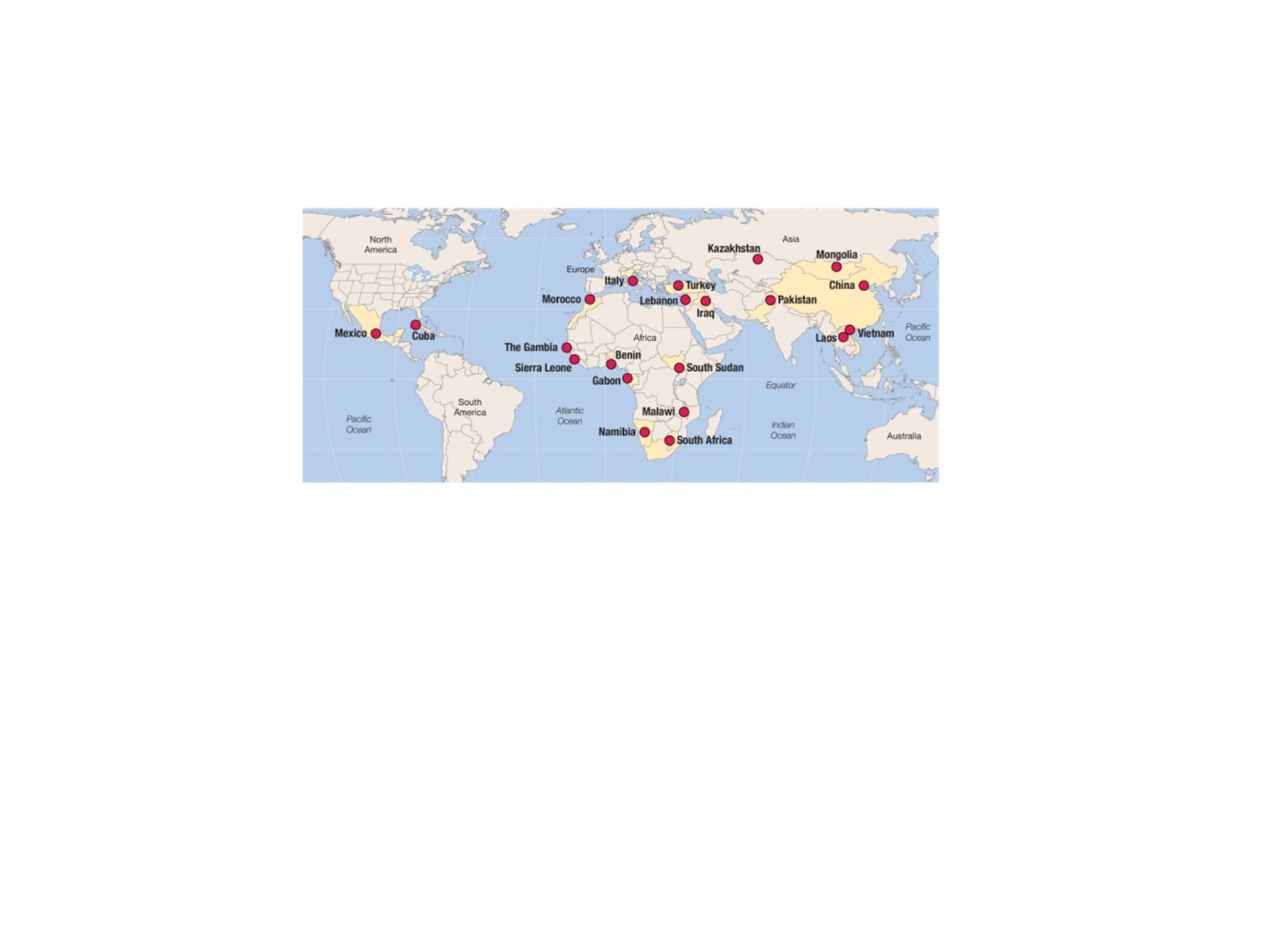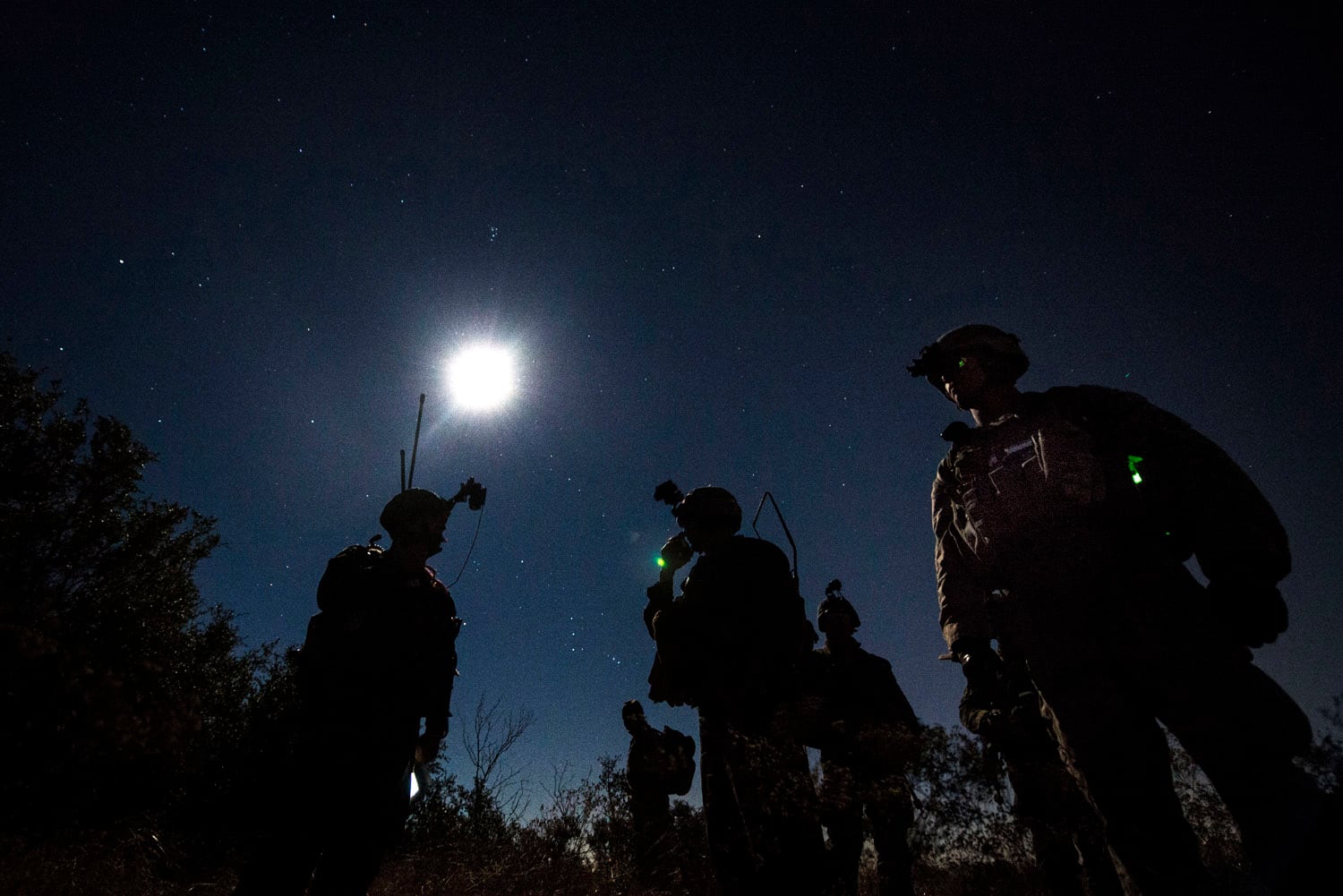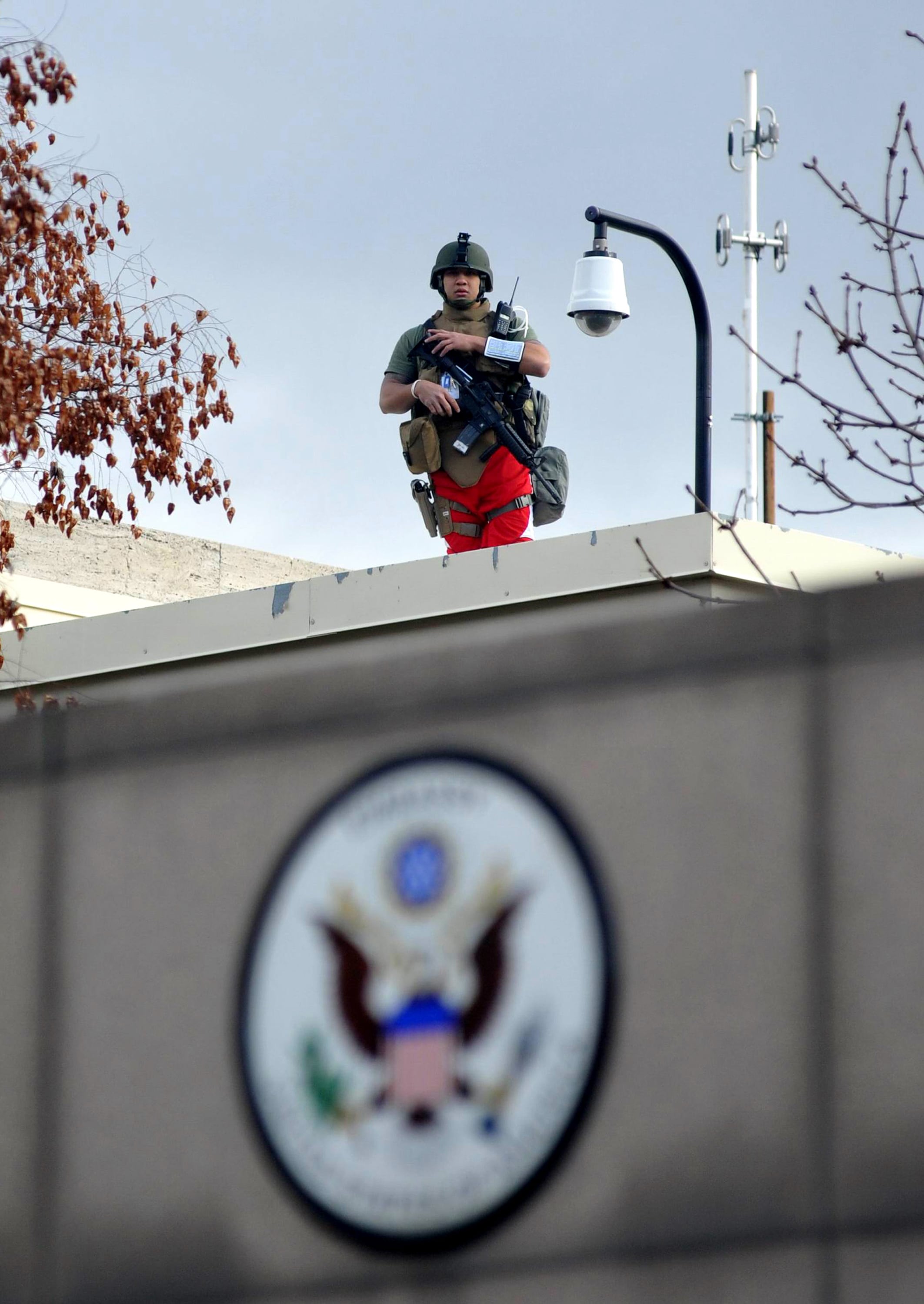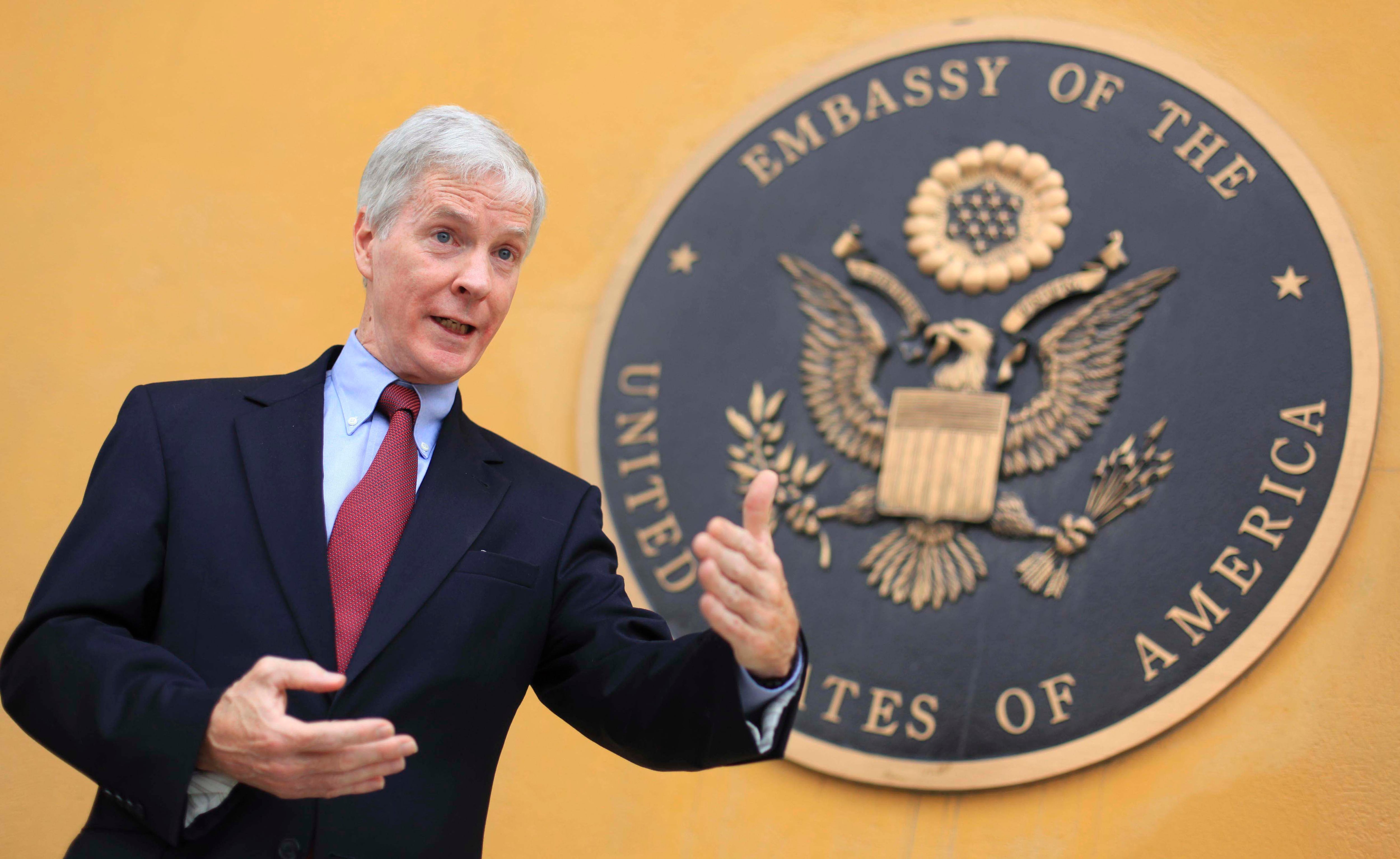The Marine Corps is taking big steps to help prevent another attack like the one on a diplomatic post in Benghazi, Libya, in 2012 that left four Americans dead.
The service has established about two dozen new Marine security guard detachments and beefed up 117 others as part of a multifaceted plan to protect U.S. embassies and consulates around the globe.
Twelve additional locations will get new security detachments by 2018 as the Corps boosts its number of embassy guards to counter increasing threats and attacks against diplomatic facilities.
The new detachments are be located across the continents in places like Turkey, China, Lebanon, Sierra Leone and South Africa. The locations are not confined to third-world countries where anti-American sentiment is strong; Marines are also boosting their presence in places like Italy, Laos and Mexico.
New Marine security guard detachments:

Marine security guards are now posted at nearly two dozen embassies and consulates since the deadly 2012 attack on a diplomatic facility in Benghazi, Libya.
Photo Credit: John Bretschneider/Staff
Land-based Marine crisis response units are also equipped and trained for events such as the Sept. 11, 2012, terrorist attack on the U.S. consulate in Benghazi. No MSG detachment was present there or in the Libyan capital, Tripoli, which prompted lawmakers to better protect diplomatic personnel and facilities across the globe.
The boost is necessary, even amid a military drawdown, said Col. Rollin Brewster, the commanding officer of the Marine Corps Embassy Security Group.
"The world is a dynamic, changing place," he said. As the Marine Corps works through what that new normal looks like, the expansion provides greater anti-terrorism measures — what he called "meaningful work that matters."

Marine security guards hoist the flag during morning colors.
Photo Credit: Kathy Reesey/Marine Corps
The changes have the full backing of the Obama administration and Congress, and have been well received by diplomats and Foreign Service officers. In fact, the State Department has another 15 diplomatic posts where officials would like to add MSG detachments in coming years. This would put a Marine presence nearly 200 embassies and consulates.
Commandant Gen. Robert Neller recently told lawmakers on Capitol Hill that the Marine Corps now has 174 embassy guard detachments in 147 countries. Of those, 44 qualify for hostile fire pay and 22 are designated as combat zones.
However, some ambassadors who have served in the most challenging locations say there's one important step missing. They strongly recommend the Marine Corps and State Department review assignment policies and update decades-old rules of engagement to better address evolving and emerging threats.
"I would urge a rethink of detachment ROE to give an ambassador greater flexibility in how to deploy the Marines in a contingency," said retired Ambassador Ryan Crocker, who has served as the U.S. Ambassador to Afghanistan, Iraq, Pakistan, Syria, Kuwait and Lebanon. "Those ROEs have not changed in probably three decades. The world has."
The embassy security plus-up
In 2013, Congress mandated that the Corps add 1,000 new Marine security guards, which essentially doubled the size of the Embassy Security Group. The move allowed the service to keep an additional 1,000 Marines at the end of its post-war drawdown.
Neller said the Corps has thus far added 603 of those 1,000 Marines. About 200 are assigned to new Marine security guard detachments, and another 274 have been sent to boost existing detachments. The remaining 130 are assigned to the Marine Security Augmentation Unit, which can dispatch teams of MSGs to embassies in distress at the direct request of an ambassador, chief of mission or regional security officer on the ground.
The Marine Corps is working closely with the State Department to stand up each new detachment, Brewster said. The State Department must meet certain diplomatic and logistics requirements prior to activating new MSG detachments.
The Embassy Security Group works with diplomatic security personnel to determine the detachment size needed at new locations. It can take up to a year to stand up new units, but normally less if existing conditions are good.
The new teams are composed of seasoned Marine security guards with at least one 12-month tour at another post. The group is encouraging Marines to extend their special duty assignments, if possible.
Sgt Maj. Juan Alvarado, the Embassy Security Group's top enlisted Marine, recently visited the new Iraq detachment. He said the Marines there were motivated.
"They all kept saying, 'This is what I signed up for,'" Alvarado said.
Filling the gaps
The Marine Corps' mission to keep embassies safe expands far beyond traditional Marine security guard duty.
The Marine Security Augmentation Unit, or MSAU, stood up in July 2013 as a quick reaction force that can augment embassies at a moment's notice.
Each squad-sized team is assigned to a region. The Virginia-based unit has been tapped for about 60 missions so far, including a call to beef up security at the U.S. Embassy in Paris in November following the series of sophisticated attacks there by members of the Islamic State group.
Embassy guards are also supported by three new land-based special-purpose Marine air-ground task forces. Each is assigned to a specific combatant command and can be tailored to respond to crises at diplomatic posts in that part of the world. They support U.S. Africa, Central and Southern commands. The units have dispatched infantrymen to patrol diplomatic compounds and have helped evacuate personnel at embassies in places like Libya and South Sudan. The crisis response forces can also augment Marine Fleet Anti-Terrorism Security Teams, which are dispatched to embassies in distress.
Additionally, the Marine Corps has used infantry companies to fill security gaps in places like Iraq, Libya and Yemen. A Marine company was assigned to secure the compound when Crocker opened the U.S. Embassy in Kabul, Afghanistan, after the fall of the Taliban. Since they were infantrymen, he said they were not bound by "restrictive rules of engagement."

A Marine stands post at a guard tower at the U.S. Embassy in Iraq.
Photo Credit: John Moore/Getty Images
But such scenarios are not common outside of combat zones. The typical MSG detachment has only eight Marines: one staff NCO who serves as detachment commander, and seven sergeants and below. The largest detachments have 24 Marines.
Boosting the size of detachments at high-risk embassies allows Marines to patrol the perimeter, provide internal security for the chancery, and adds one more trigger puller — should things heat up.
All of those missions have led to new training for Marines.
At the MSG schoolhouse at Marine Corps Base Quantico, Virginia, the Embassy Security Group is wrapping up the third and final phase of a 10-acre training compound. It includes barracks; a $10 million, 29,000 square-foot training facility with seven functional guard stations; an Indoor Simulated Marksmanship Trainer system; and a new group headquarters modeled after actual U.S. embassies.
Marines deploying with crisis response units also undergo nonlethal weapons training for riot situations. Grunts deployed to Europe recently spent three days at the U.S. Embassy in Portugal where they were tasked with securing a facility overrun by terrorists, active shooters and violent rioters.

Students from the Marine Corps' Infantry Officer Course complete a 1,100-mile long-range embassy evacuation training mission.
Photo Credit: Sgt. Tyler Main/Marine Corps
The prevalence of embassy security missions is also evident at Infantry Officer Course, where lieutenants now regularly conduct long-range rescue training missions.
Rethinking rules of engagement
Ambassadors and Foreign Service officers have lauded the plan to boost the number of Marines at embassies and consulates. But some caution that "throwing Marines at the problem" is not enough if the embassy doesn't get the right MSGs — and if those MSGs don't get the right rules of engagement.
Retired Ambassador Barbara Bodine, who served as U.S. Ambassador to Yemen from 1997 to 2001, said officials need to take a careful look at the precarious situations diplomats sometimes find themselves in.
"I do think every U.S. Embassy should have a contingent of Marine security guards, without question," she said. "... [But] there has to be a recognition of the limits placed on Marines. There does need to be a very careful thinking through of the rules of engagement."

A Marine stands guard on the roof of one of the compounds inside the U.S. Embassy in Turkey following a suicide bombing at the entrance in February 2013.
Photo Credit: Adem Altan/AFP/Getty Images
An MSG's primary duties include access control, safeguarding classified material and emergency response. While protection of personnel is assumed, the MSGs remain limited to designated areas and have strict rules that govern engagement. Security is instead managed by nearly 800 State Department regional security officers in more than 250 posts worldwide.
In a time of need, they call on combat-equipped troops like FAST Marines to provide security. Assuming that help may not arrive on time, some feel the Marines at the embassies should be tasked with defending their fellow Americans.

Retired Ambassador Ryan Crocker
Photo Credit: Rafiq Maqbool/AP
Crocker, who reopened the embassy in Kabul, has seen MSGs in action on more than one occasion in his 37 years of service. When a mob breached the embassy walls in Syria in 1998, the small MSG detachment was ready. Countless hours of training enabled them to launch tear gas at precise points and quell the uprising.
"That's just one example of what a half-dozen of America's finest can do at maybe 2,000 miles from the nearest reinforcements," said Crocker, who in 2012 became only the 75th civilian to be named an Honorary Marine since the Corps' founding in 1775. "In such places, that's all you've got — those Marines."
But sometimes those Marines are not enough. Because their rules of engagement are too restrictive, Crocker opted for a Lebanese security force when he reopened the Beirut embassy in 1990.
"I needed to be sure we could fight in any way we might need to, not just to defend the chancery building but to defend on the wire," said Crocker, who pointed out that the compound was surrounded by a heavily wired perimeter rather than a wall. "So instead of a Marine detachment, I brought in additional regional security officers who could shoot anywhere I told them to shoot."
Maj. Clark Carpenter, a Marine spokesman at the Pentagon, said Corps officials "continually" have conversations with the State Department on how to improve security. That's "absolutely critical and something we take very seriously," he added.
"We always want to look at ways to improve our security and keep the enemy off balance," Carpenter said.

Retired Ambassador Barbara Bodine
Photo Credit: File
Bodine called Marines "a tremendous addition to every embassy," adding that they should have been in Benghazi and could have made a significant difference there. But she still cautioned against turning embassies into something that looks like an armed camp. To do so could project hostility and adversely affect the embassy's mission.
"There is a drive to make our embassies perfectly safe so that nothing bad ever happens to anybody. The only way to do that is to keep people inside the walls," she said. "But embassies cannot be fortresses, and diplomats can't be hermetically sealed in embassies and still do their job."
Bodine now serves as director of Georgetown University's Institute for the Study of Diplomacy. Her 30-plus years in Foreign Service were spent primarily on Arabian Peninsula, including a tour as deputy chief of mission in Kuwait during the Iraqi invasion and occupation in 1990-1991 (for which she received the Secretary's Award for Valor).
While she would want no other force guarding the compound, she does feel that young Marines may not always be the best choice to face the increasingly complex threats faced at the most at-risk embassies.
"They are really good guys and I absolutely adore them, but they are really, really young," she said. "The Marines may have to think about sending more seasoned, at least [in their] late 20s. I have quite literally on occasion entrusted my life to those 19- and 20-year-olds, but the ... change in mission is going to take someone with just a little bit more time under his belt."
All MSGs currently serve 12 months at three posts, while detachment commanders serve 18 months at two posts. Marines typically aren't sent to the more challenging posts until their second assignment. Even then, many are not of legal drinking age back in the U.S.




